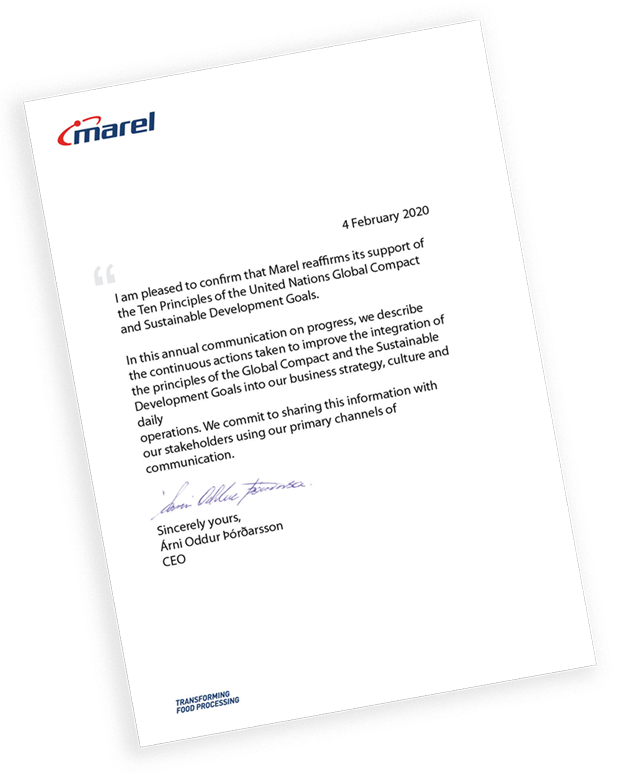Corporate social responsibility

Our contribution to the sustainable development goals of the United Nations
Marel focuses its efforts on benefitting people, the planet and our operations in terms of three of the United Nations Sustainable Development Goals:
Goal 2: End hunger, achieve food security, improve nutrition and promote sustainable agriculture
Goal 9: Build resilient infrastructure, promote inclusive and sustainable industrialization and foster innovation
Goal 12: Ensure sustainable consumption and production patterns
We view innovation that boosts productivity as the primary way to make meaningful contributions toward these goals. Innovation has always been a core driver of Marel’s endeavors. Annually, we invest about 6% of our revenues into research and development. We also foster innovation by working in partnership with our customers, universities and other partners to develop breakthrough solutions that support sustainable development in food production (Goal 9).
To ensure sustainable consumption and production patterns (Goal 12), we work hard to create solutions that reduce food waste, increase efficient resource use, boost yields, add recycling options and optimize portion sizes. Marel takes part in building and supporting infrastructure by partnering with multiple stakeholders throughout our value chain to promote sustainable industrialization and foster innovation through modernizing food processing technology.
Traceability, increased quality and food safety are key to how Marel develops and produces solutions and software for food processing. Our Innova Food processing Software provides processors with full traceability of raw ingredients as they flow through production. Such solutions contribute directly to food security, increased efficiency and improved nutrition for consumers around the globe (Goal 2).
Marel CSR guidance policy
Social responsibility
Environmental responsibility
Economic responsibility
Nasdaq ESG reporting guidelines
Environmental reporting guidelines
|
Metric
|
2019
|
2018
|
Units
|
|
|---|---|---|---|---|
|
E1
|
Direct & indirect GhG emissions
|
19,600
|
20,659*
|
Tonnes CO2e
|
|
E1.1
|
Scope 1
|
3,860
|
4,143*
|
Tonnes CO2e
|
|
E1.2
|
Scope 2
|
3,427
|
3,633
|
Tonnes CO2e
|
|
E1.3
|
Scope 3
|
12,313
|
12,880
|
Tonnes CO2e
|
|
E2
|
Emission intensity
|
15.3
|
17.2*
|
kgCO2e per 1000 €
|
|
E3
|
Energy usage
|
49.5
|
48.9*
|
GWh
|
|
E3.1
|
Directly consumed
|
17.1
|
16.9
|
GWh
|
|
E3.2
|
Indirectly consumed
|
32.4
|
32.0
|
GWh
|
|
E4
|
Energy intensity
|
7.9
|
8.4*
|
MWh per FTE
|
|
E5
|
Energy mix
|
57%
|
56%
|
Share of renewables
|
|
E6
|
Water usage
|
-
|
-
|
|
|
E7
|
Environmental operations
|
|
|
|
|
E7.1
|
Formal environment policy
|
Yes
|
Yes
|
|
|
E7.2
|
Specific waste, water, energy, and/or recycling polices
|
Yes
|
Yes
|
|
|
E7.3
|
Recognized energy management system
|
No
|
No
|
|
|
E8
|
Climate oversight / board
|
No
|
No
|
|
|
E9
|
Climate oversight / management
|
Yes
|
Yes
|
|
|
E10
|
Climate oversight / management (continued)
|
-
|
-
|
|
* Restated due to improved data accuracy.
Social reporting guidelines
|
Metric
|
2019
|
2018
|
Units
|
|
|---|---|---|---|---|
|
S1
|
CEO pay ratio
|
|||
|
S1.1
|
CEO pay ratio
|
12.8:1
|
12.5:1
|
CEO total compensation as ratio to median FTE total compensation
|
|
S1.2
|
Reported in regulatory filings
|
Yes
|
Yes
|
|
|
S2
|
Gender pay ratio
|
1.1:1
|
1.1:1
|
Median male compensation to median female compensation
|
|
S3
|
Employee turnover ratio
|
10.9%
|
11.9%
|
Year-over-year change for full-time employees
|
|
S4
|
Gender diversity
|
|||
|
S4.1
|
Total enterprise headcount
|
16/84
|
15/85
|
Women/men ratio
|
|
S4.2
|
Entry- and mid-level positions
|
-
|
-
|
Women/men ratio
|
|
S4.3
|
Executive team
|
17/83
|
17/83
|
Women/men ratio
|
|
S5
|
Temporary worker ratio
|
14%
|
16%
|
Contractors/Part-time worker ratio
|
|
S6
|
Non-discrimination policy
|
Yes
|
Yes
|
Policy in place
|
|
S7
|
Injury rate
|
3.8
|
3.2
|
|
|
S8
|
Global health & safety
|
Yes
|
Yes
|
Policy in place
|
|
S9
|
Child & forced labor
|
|||
|
S9.1
|
Child & forced labor policy
|
Yes
|
Yes
|
Policy in place
|
|
S9.2
|
Policy covers suppliers and vendors
|
Yes
|
Yes
|
Included
|
|
S10
|
Human rights
|
|||
|
S10.1
|
Human rights policy
|
Yes
|
Yes
|
Policy in place
|
|
S10.2
|
Policy covers suppliers and vendors
|
Yes
|
Yes
|
Included
|
Corporate governance reporting guidelines
|
Metric
|
2019
|
2018
|
Units
|
||
|---|---|---|---|---|---|
|
G1
|
Board diversity
|
||||
|
G1.1
|
Total board seats occupied by women (compared to men)
|
42/58
|
42/58
|
Women/men ratio
|
|
|
G1.2
|
Committee chairs occupied by women (compared to men)
|
33/67
|
33/67
|
Women/men ratio
|
|
|
G2
|
Board independence
|
||||
|
G2.1
|
CEO prohibited from serving as board chair
|
Yes
|
Yes
|
||
|
G2.2
|
Total board seats occupied by independents
|
100%
|
100%
|
||
|
G3
|
Incentivized pay
|
No
|
No
|
||
|
G4
|
Collective bargaining
|
-
|
-
|
||
|
G5
|
Supplier code of conduct
|
||||
|
G5.1
|
Vendors or suppliers required to follow code of conduct
|
Yes
|
Yes
|
||
|
G5.2
|
Share of suppliers that have formally certified their compliance with code
|
-
|
-
|
||
|
G6
|
Ethics & anti-corruption
|
||||
|
G6.1
|
Ethics and/or anti-corruption policy in place
|
Yes
|
Yes
|
||
|
G6.2
|
Share of workforce that has formally certified their compliance with policy
|
-
|
-
|
||
|
G7
|
Data privacy
|
||||
|
G7.1
|
Data privacy policy in place
|
Yes
|
Yes
|
||
|
G7.2
|
Steps taken to comply with GDPR rules
|
Yes
|
Yes
|
||
|
G8
|
ESG reporting
|
||||
|
G8.1
|
Sustainability report published
|
Yes
|
Yes
|
||
|
G8.2
|
Sustainability data included in regulatory filings
|
Yes
|
Yes
|
||
|
G9
|
Disclosure practices
|
||||
|
G9.1
|
Sustainability data provided to sustainability reporting frameworks
|
Yes
|
Yes
|
||
|
G9.2
|
Focus on specific UN Sustainable Development Goals (SDGs)
|
Yes
|
Yes
|
||
|
G9.3
|
Targets set and progress reported on the UN SDG's
|
Yes
|
Yes
|
||
|
G10
|
External assurance
|
Partially
|
Partially
|
Sustainability disclosures assured or validated by a third party
|



